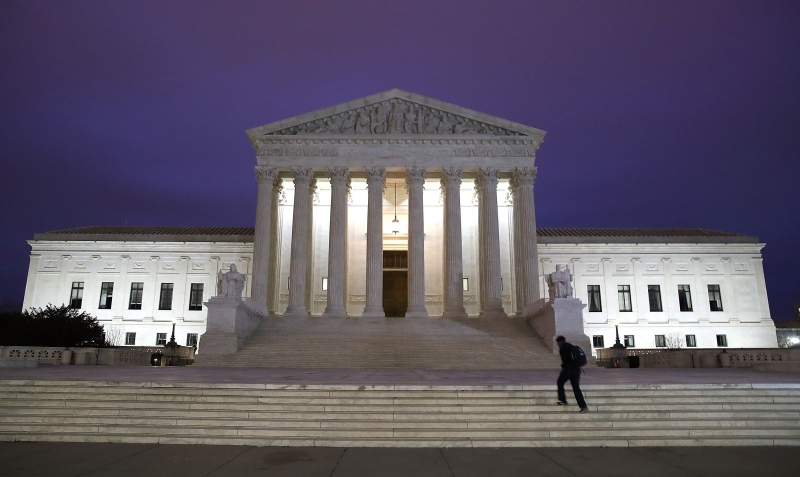
Contrary to longstanding precedent, individualism reigns supreme in recent legal decisions over COVID-19.
In two recent cases—Roman Catholic Diocese of Brooklyn v. Andrew M. Cuomo and South Bay United Pentecostal Church v. Gavin Newsom—the U.S. Supreme Court struck down COVID-19 emergency restrictions on religious gatherings. On the surface, the Justices argued with each other over factual questions, such as whether religious institutions were actually being treated differently than secular ones, whether evidence demonstrated that the restrictions were necessary, and whether changes in the pandemic, at least for the moment, made the cases moot. But underneath these arguments, another fight has been ensuing over the current viability of the Court’s 1905 decision in Jacobson v. Massachusetts. Ultimately, this fight is over the nature of rights and liberty under the American Constitution. Who wins this fight will define America for perhaps a century or longer, determining what Americans owe their country and each other.
In 1902, smallpox was spreading in America. There was a vaccine, but industrial pharmaceutical production was in its infancy, and anti-vaccine sentiment was widespread. When vaccination rates fell, outbreaks emerged, and health authorities responded by rolling out vaccination campaigns. In Massachusetts, the Board of Health of Cambridge, facing the epidemic, ordered all residents to be vaccinated. Henning Jacobson, a local minister, refused and was fined $5. Backed by anti-vax advocates, he took his case all the way to the Supreme Court.
In those days, haphazardly made vaccines were killing people, so Jacobson’s unwillingness was not beyond all reason. Yet he lost, and to no one’s surprise. Having laid out the evidence that smallpox vaccination was generally regarded as safe and effective, and noting that Jacobson offered no evidence that vaccination might be particularly dangerous to him, the court explained why he could not demand simply to be left alone. He did indeed have a constitutional right to liberty, but if it came down to a conflict between his individual liberty and the welfare of the community, well—as the old maxim put it in other cases—salus populi supreme lex: the health of the people is the supreme law.
To the Supreme Court of that day, this principle was not just some hoary relic of the common law; rather it was “a fundamental principle of the social compact that the whole people covenants with each citizen and each citizen with the whole people.” The Court concluded “that all shall be governed by certain laws for ‘the common good,’ and that government is instituted ‘for the common good, for the protection, safety, prosperity, and happiness of the people, and not for the profit, honor, or private interests of any one man, family, or class of men.’” Americans get all the benefits of civil society—cooperation, good government, potable water, public health protection, democracy, and even liberty itself—agreeing, in turn, that there may be times when individual interests must give way to the needs of society.
The Court’s reasoning was not novel. It went back to a document that every schoolchild once knew: the Mayflower Compact of 1620, which reflected the ideas of political philosophers John Locke and Thomas Hobbes. The Court also drew upon more than a century of legal thinking that guided governmental regulatory action through the 1800s. Salus populi’s legal sibling was a maxim called sic utere tuo ut alienum non laedas—use your own property so as not to injure the property of others. You could build a pier into the river from the bank you owned—but not so far into the river as to interfere with shipping. You could open a business melting fat into tallow—but, if you made too much stink, your neighbors could shut you down. Like salus populi, this maxim drew a line of public good around the rights of individuals to pursue their own interests.
This restriction was not oppression, but a core facet of the social compact on which American governmental authority was based. And it was absolutely necessary in practical terms. As the Jacobson Court put it:
The liberty secured by the Constitution of the United States to every person within its jurisdiction does not import an absolute right in each person to be, at all times and in all circumstances, wholly freed from restraint. There are manifold restraints to which every person is necessarily subject for the common good. On any other basis, organized society could not exist with safety to its members.
For well over a hundred years—through polio, measles, HIV, and Ebola—Jacobson sailed the legal seas of public health as the accepted leading case, important both for its specific legal standards and its vision of the social contract in emergencies.”
Jacobson’s importance in modern law does not stem from its “test” in a First Amendment or Due Process case or even the vitality of its general posture of deference to public health authorities in an emergency. The important issue is its vision of coexistence and cooperation in a democratic commonwealth. Today, however, Jacobson’s vision is in jeopardy. Although many of the hundreds of COVID-19 constitutional cases have followed the precedent on a few significant occasions, courts have unveiled a new view based less on the social contract than on a strong form of libertarianism. For example, in a case overturning Wisconsin’s COVID-19 emergency measures, the state supreme court did not see the problem as a pandemic so much as it saw the problem as tyranny. Saving lives is a worthwhile goal, but secondary, as one of the justices explained: “The people of Wisconsin pronounced liberty to be of primary importance, establishing government principally to protect their freedom.”
The libertarian language is not subtle. These cases have the hyperbolic ring of an anti-mask protest on the steps of a state capitol. In a case overturning the Pennsylvania governor’s pandemic restrictions, a federal judge demonstrated with the specter of a coup how the hyper-libertarian approach recasts and raises the stakes: “In an emergency, even a vigilant public may let down its guard over its constitutional liberties only to find that liberties, once relinquished, are hard to recoup and that restrictions—although expedient in the face of an emergency situation—may persist long after immediate danger has passed.”
The Jacobson court reasoned that government is ordained for the good of us all, and so the rights of individuals, although sacred, can be set aside when it is necessary for the common good. In legal terms, the Jacobson court established a test of reasonable necessity, not a balancing of individual rights versus the public good.
But in these new libertarian cases, the reasoning is flipped. Government is established primarily to protect the liberty of individuals, and that individual liberty must be protected even if it puts all the rest of society at risk. The judge in the Pennsylvania case put it like this: “The Constitution cannot accept the concept of a ‘new normal’ where the basic liberties of the people can be subordinated to open-ended emergency mitigation measures. Rather, the Constitution sets certain lines that may not be crossed, even in an emergency.” The court’s task, according to this judge, is to “balance the legitimate authority of public officials in a health emergency with the Constitutional rights of citizens.” As a result, the hypothetical risk of a governor using emergency power to become a tyrant becomes more urgent to forestall than the virus that is actually killing people.
These cases are not outliers. The recent strict scrutiny of religious claims is quite consistent with nearly two decades of Supreme Court cases overturning once-standard public health measures on corporate free speech grounds. Moreover, the federal appellate bench and the Supreme Court are now more populated with judges sympathetic to or even leading the charge of hyper-libertarianism. In their view of America, the social contract is a one-sided deal: you have the right to exploit or be exploited, to win or lose—beat COVID or die—as individuals. The collective has nothing to say about it. This version of America resembles a Hobbesian war of all against all, not a commonwealth of citizens building value together, and it leads to a few big winners in gated enclaves and a majority that is sick, tired, stressed, and increasingly humiliated.
It is an ugly vision of America. A country that started with the idea of the commonwealth, where the individual would thrive and be free if the community thrived, where individual economic success was understood as a means necessary to a social end, has become a winner-take-all contest in a social colosseum. People who need help are derided as losers and parasites, and the call to put self-interest second to the common good is angrily denounced as socialism.
It is an ugly vision, but more importantly, a doomed one. The problems America faces, from extreme social inequality to climate change, require cooperation and shared sacrifice. As the Jacobson court said, a “society based on the rule that each one is a law unto himself would soon be confronted with disorder and anarchy.”
Public health law’s battle for the nation’s soul is the fight for America’s future. As in the recent Supreme Court cases on COVID-19 and religion, judges are now applying their strictest scrutiny to set aside painful but reasonable emergency regulations on the ground that America’s highest law is the protection of individual liberty. Elevating individual liberty over the common good will not get COVID-19 under control nor help the nation face the ongoing challenges of social inequality, climate change, or deep social divisions.
To achieve fairness, and to survive, the nation must heed the more traditional wisdom of American law: “Real liberty for all could not exist under the operation of a principle which recognizes the right of each individual person to use his own, whether in respect of his person or his property, regardless of the injury that may be done to others.”




